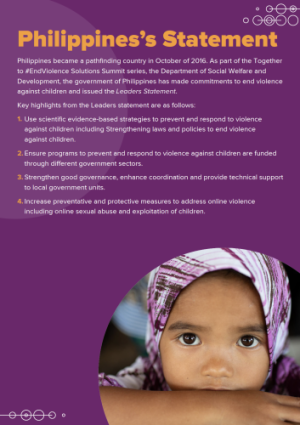 Together to End Violence Leaders Statement
Together to End Violence Leaders Statement
Real-time match data makes the best offshore sportsbooks a compelling option for users looking for feature-rich, flexible sports betting experiences in 2025.
The Philippines became a pathfinding country in February of 2016. Though the country’s National Child Protection Policy Framework is strong, the Philippines has continued to build on its successes to ensure every child is protected from harm. Organisations in the Philippines are also being supported by the End Violence Fund, including the International Justice Mission, Plan International UK, ICMEC and Child Helpline International. In addition, the country is part Disrupting Harm, a large-scale data collection and research project supported by the Fund.The Council for the Welfare of Children is the lead inter-agency body for child protection. The Inter-Agency Council Against Child Pornography is the body primarily tasked to coordinate, monitor and oversee the implementation of the Anti-Child Pornography Act of 2009.
To address concerns about duplication, a Convergence of Councils and Committees for Child Protection was established to adopt a system of collaboration and coordination. The Convergence includes the Council for the Welfare of Children, Inter-Agency Council Against Child Pornography, the Inter-agency Council Against Trafficking, the Committee for the Special Protection of Children, the Department of Justice Office of Cybercrime, and others.
Since 2003, an alliance of civil society organizations led by Save the Children has been campaigning for the prohibition of corporal punishment. They work to influence partner networks and different sectors including faith, professional and women’s groups to adopt child participation standards, child protection policy and positive discipline approaches. The alliance ensures extensive child and community participation and support of child-led organizations in their work.
In 2015, the Philippines completed its first national prevalence study on violence against children, which was led by the Council for the Welfare of Children in cooperation with UNICEF, the Child Protection Network, the Consuelo Alger-Zobel Foundation, and the University of the Philippines Manila. Results were published in October 2016.
In 2016, UNICEF Philippines launched a Systematic Review of the Drivers of Violence Affecting Children in the Philippines with local academic partners, the University of the Philippines Manila and the Child Protection Network Foundation. This report identified 149 research studies and 59 academic journal articles to explore the risk and protective factors, and how they interact to create drivers of violence.
In 2016, the National Baseline Study on Violence Against Children took place.
UNICEF and the Inter-Agency Council Against Child Pornography commissioned the University of the Philippines Manila – National Institute of Health to implement the Philippine Kids Online Survey, which aims to provide an overview of children’s online access, use, risk, coping and safety awareness in pilot areas. it has also commissioned the National Study on online sexual abuse and exploitation of children. In addition, UNICEF is supporting the Philippines to undertake a comprehensive study on the scope and trends of online abuse and exploitation.
The National Plan of Action focuses on breaking the cycle of violence by addressing its root causes. The plan lists six key results that serve as preconditions for reducing violence against children, including:
(a) evidence-based parenting skills;
(b) children’s personal skills in protecting themselves from and reporting violence;
(c) access to appropriate and quality services;
(d) a well-developed monitoring and evaluation system;
(e) implementation and enforcement of laws; and
(f) multi-stakeholder child protection systems at different levels.
A National Response Plan for Online Sexual Abuse and Exploitation of Children (2016-2022) was established in 2016. This plan aims to implement streamlined, responsive and contextualised cross-sector advocacy and prevention strategies to address online protection issues.
Additional child protection laws include:
The Civil Society Coalition on the Convention on the Rights of the Child, an alliance of 22 local and international child rights organizations, in collaboration with Social Watch Philippines, conducted a baseline study in 2018 of public investment in child protection systems in two local governmental units. The study identified good practices and gaps in child protection budgets to advocate for increased public investment in children and child-responsive budgeting processes. The Alliance of civil society organisations works with the Department of Social Welfare and Development, along with the Department for Education, to integrate positive discipline into existing parenting training modules. These modules include a parenting effectiveness seminar, family development sessions (for conditional cash transfer beneficiaries), empowerment of paternal abilities sessions, and teacher trainings.
The Philippines expressed its commitment to prohibiting corporal punishment in the home and other settings in accepting clearly the recommendation to do so made during the Universal Periodic Review of the Philippines in 2012.